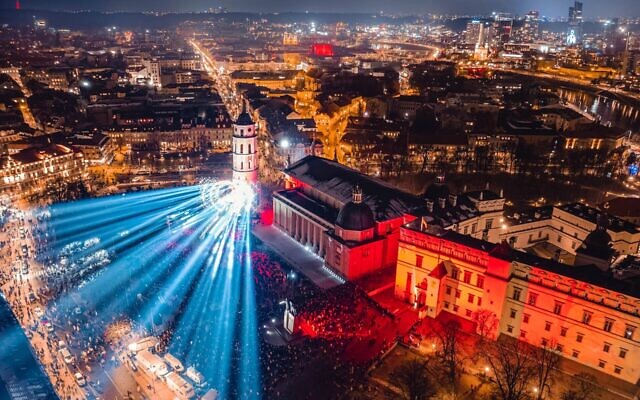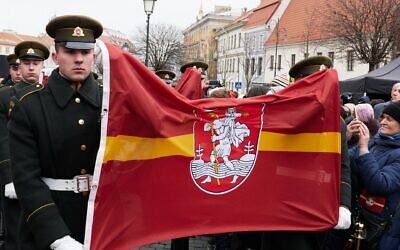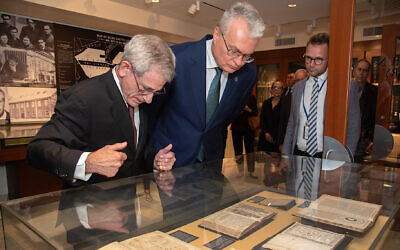Vilnius is celebrating its 700th anniversary. Lithuanian Jews are commemorating a darker one
Starting in the early 19th century, Vilnius was one of the most important Jewish centres in the world, known as the Jerusalem of the North.

Legend has it that in the early 14th century, the grand duke of Lithuania set out on a hunting trip. One night, he dreamt of an enormous iron wolf, which a priest would later tell him was a sign that he should establish a city on the site where he had slept.
Whether or not the origin story is true, it’s uncontested that the present-day Lithuanian capital Vilnius was first referred to by its former name, Vilna, in documents and letters in 1323 — making this year, in the government’s eyes, the city’s 700th anniversary.
The city is marking the anniversary year throughout 2023 with various festivals, visual art exhibitions, lectures and more. The organisers of Vilnius 700 stress that they are including Jewish people and themes in the celebrations through a range of programming.
That’s because for a portion of the city’s existence, starting in the early 19th century, Vilnius was also one of the most important Jewish centers in the world, known as the Jerusalem of the North. Roughly half of the city was Jewish, and it was a Jewish cultural powerhouse, a deep well of Yiddish and Hebrew literature. In 1910, the city had over 100 synagogues, along with Jewish schools, publications, and charitable and political organisations.
“The Jewish community is an integral part of Vilnius’ past and present, playing an important role in the city’s day-to-day life,” Tomas Gulbinas, Vilnius’ deputy mayor, wrote in an email.
Yet this weekend also marks a darker anniversary: 80 years since the final liquidation of the Vilna Ghetto, a Jewish ghetto that saw almost all of its over 50,000 Jews die at the hands of the Nazis.
On Saturday, Lithuanian Prime Minister Ingrida Simonyte joined others in a march from the city’s former Jewish ghetto to Paneriai, the forest site formerly known as Ponary where the Nazis and their local collaborators murdered 70,000 Jews, mostly Lithuanian, over three years during the Holocaust.
The twin anniversaries have brought into stark relief tensions over historical memory in Lithuania, where, as in neighboring Poland and Latvia, officials have downplayed the role of local collaborators in carrying out the Nazis’ murderous plans.

Memorials to Lithuanians who fought with the Nazis against the Soviet Union are plentiful in the city, making that history loom both literally and figuratively over the 700th birthday party.
“There is an unresolvable tension between desire to celebrate and this history that is not much to celebrate,” said Laimonis Breidis, a Vilnius native whose book “Vilnius: City of Strangers” explores the city’s history through the insights of travelers. The biggest challenge, he said, is that “everything told about the city is compartmentalised.”
Almost all of the few thousand Jews living in Vilnius today have familial ties to people who died during the Holocaust, said Faina Kukliansky, chair of the Lithuanian Jewish (Litvak) Community. She said in an interview earlier this year that the community was more determined to commemorate the ghetto anniversary than the city one.
“I promise you, we, the Lithuanian Jewish community, will not forget this date,” she said.
How Lithuania’s Holocaust history is remembered became an issue of high drama in 2019, after a Chicago schoolteacher named Sylvia Foti published a book recounting how her grandfather — Jonas Noreika, a general and formerly a national hero — had agreed with the Nazis about the extermination of Jews.
The book caused an uproar. Lithuania’s parliament then voted to remove the head of a national genocide research center, Adas Jakubauskas, after he insisted Noreika had tried to save Jews; 17 historians wrote to the center complaining that Jakubauskas was compromising the quality of their research. For his part, Jakubauskas charged that he was being pressured by Israel and Russia to indict Lithuanian participants without evidence.
Yet the country continues to memorialise the Holocaust without calling attention to the role that Lithuanians played in carrying it out.
Dani Dayan, chairman of Yad Vashem, Israel’s Holocaust memorial authority, said this week in a special session of the Lithuanian Parliament that the country “must consistently acknowledge that many of the Lithuanian Jews massacred in the Holocaust died at the hands of their Lithuanian co-nationals and that Lithuanians also took part in the extermination of Jews in neighboring countries.”
Such an acknowledgement is not a centerpiece of the Vilnius 700 programming, in part because its emphasis on celebration is focusing attention to happier moments in local Jewish history.
Gulbinas listed the Jewish-themed projects the city has undertaken in conjunction with its 700th anniversary: city tours, put on by Undiscovered Vilnius, that highlight the city’s Jewish history; the city’s involvement in the reconstruction of the Great Synagogue of Vilnius, which was mostly destroyed by the Nazis; the renovation of the grave of the Vilna Gaon, a hugely influential 18th-century rabbi, and the upkeep of Jewish cemeteries; and a graffiti art project, “Walls That Remember,” in which artists have painted images harkening back to the era when the city’s Jewish community was thriving.
“Simultaneously, Vilnius honors the present Jewish customs and traditions, for example, by celebrating Hanukkah together with the local Jewish community every year,” Gulbinas wrote.
A pavilion at the National Museum of Lithuania that is open until Oct. 15 recreates Vilnius as it stood 200 years ago — at the dawn of the city’s Jewish heyday.
Meanwhile, the Jewish community has held events tied to the ghetto anniversary outside of the Vilnius 700 umbrella. Earlier this month, in the courtyard of the former Jewish Council headquarters in the Jewish Ghetto, Šimonytė attended an exhibition and concert on the liquidation anniversary.

On Thursday, the city of Vilnius introduced a commemorative route — ”Panerių kelias,” or road of Paneriai, named for the site of a massacre of 100,000 people, many of whom were Jewish, during World War II — along which processions were organised on that same day and on the 24th.
An additional exhibition, “Healing Soul Wounds,” which, per an official from the city, “reveals the traumatic experiences and dilemmas of young girls, teenagers and women in order to survive the brutal conditions of World War II and the Holocaust,” opened last week.
In a few cases, the histories — that of Vilnius and that of the Vilna Ghetto — were commemorated together in official Vilnius 700 events. At a concert outside the former Vilna Ghetto Jewish Council in July, Michael Gordon, the American composer and founder of the acclaimed Bang on a Can music collective, whose father grew up outside of Vilnius, debuted an original composition for nine trombones.
The courtyard was Gordon’s idea. The organisers of the music component of Vilnius 700 reached out to him, he said, and sent a list of sites where he could debut an original composition. In his reply, he said, he pointed out that “there’s a big and long and illustrious history of Jewish culture, both secular and sacred, in Vilnius, and none of these sites are Jewish sites. Can we consider a Jewish site? And they said yeah, great.”
Gordon chose the courtyard in part because of its connection to Jewish arts: on one side of the courtyard stood a Yiddish theater; on another, a Yiddish conservatory. And the city also has a personal connection to Gordon, whose father, a Litvak, lived in Vilnius in the 1930s. He called his composition “Resonance.”
Roughly 300 people came to the concert, said Gordon, who spoke a little about the event about “the presence of Jewish culture in Lithuanian history.”
“I was happy about that,” he said. “I kind of felt it was my responsibility…I felt, wow, I have this opportunity to go here and, in a certain sense, honor the Jewish history in this place, in this very important center of Jewish learning and Jewish arts and culture.”
That kind of attention was all too rare in the past, according to Laima Lauckaite, the curator of a collaborative exhibition between the Lithuanian Art Centre TARTLE and the YIVO Institute for Jewish Research in New York City that is open now.
Lauckaite did not grow up fully aware of her city’s Jewish history while a schoolgirl during the Soviet years near where the Great Synagogue of Vilna once stood. Soviet authorities had rased the synagogue’s ruins and erected a school; underground remains were not identified until 2015.
“I never knew about it, that there was the Great Synagogue,” she said. “I got to know about it only 30 years after.”
The collaborative exhibit in New York City displays an exhibition of Vilnius guidebooks that reflect the city’s 19th and 20th century history and “its multi-ethnic, multicultural landscape.”Lithuanian President Gitanas Nausėda visited YIVO last week to pay tribute to the Jews who rescued rare books and documents from the Vilna Ghetto.
Dovid Katz, former professor of Yiddish Studies at Vilnius University, has spent the past 15 years editing Defending History, a site dedicated to fighting Holocaust distortion. He has also participated in numerous events to mark Vilnius 700.
“While it is very nice that authorities have included Jewish-themed programs in the year’s commemorations dedicated to the city’s history, it is shameful that they have not permanently taken down any of the state-sponsored public-space shrines to Holocaust collaborators and perpetrators,” Katz said.
He stressed that the narratives downplaying Lithuanian culpability in the Holocaust emanated from a relative few influential nationalists, not the mass of Lithuanians celebrating Vilnius.
“I love living here. The people of today’s Lithuania are terrific,” he said. “The problem is with a small ultra-powerful, state-funded ‘history fixing unit’ that dominates on these issues in politics, museums, media, arts and academia.”
Katz suggested, as well, that the Jewish community should have focused on a different anniversary — and that its attention to the September dates related to the ghetto’s liquidation reified the country’s Holocaust memory problems.
“Of the thousands of Lithuanian Jewish Holocaust survivors we interviewed over more than three decades, all felt that the appropriate day for commemoration of the Lithuanian Holocaust is June 23rd,” he said.
On that day in 1941, “600 years of peace was broken by the outbreak of barbarity, humiliation, slaughter in hundreds of towns across the land. By the end of 1941, all the close to 250 or so storied shtétlakh (shtetls) were destroyed, as were the overwhelming majority of Lithuanian Jews.”
Focusing only on the liquidation of the ghetto, he said, “reflects a state attempt to deflect from the primary narrative via one that focuses only on the Germans (the ghetto history) and not on the thousands of local participants all across the land.”
Vilnius 700 events are scheduled through the end of the year, ensuring that the tensions over history and memory in the city continue to simmer.
But not all see the need to bring up the city and Holocaust anniversaries in the same conversation. David Roskies, chair emeritus in Yiddish literature at the Jewish Theological Seminary in New York, wrote in an email: “I don’t see any intersection between the two anniversaries. It’s pure happenstance. Who can say with any precision when Vilnius was established?”

Thank you for helping to make Jewish News the leading source of news and opinion for the UK Jewish community. Today we're asking for your invaluable help to continue putting our community first in everything we do.
For as little as £5 a month you can help sustain the vital work we do in celebrating and standing up for Jewish life in Britain.
Jewish News holds our community together and keeps us connected. Like a synagogue, it’s where people turn to feel part of something bigger. It also proudly shows the rest of Britain the vibrancy and rich culture of modern Jewish life.
You can make a quick and easy one-off or monthly contribution of £5, £10, £20 or any other sum you’re comfortable with.
100% of your donation will help us continue celebrating our community, in all its dynamic diversity...
Engaging
Being a community platform means so much more than producing a newspaper and website. One of our proudest roles is media partnering with our invaluable charities to amplify the outstanding work they do to help us all.
Celebrating
There’s no shortage of oys in the world but Jewish News takes every opportunity to celebrate the joys too, through projects like Night of Heroes, 40 Under 40 and other compelling countdowns that make the community kvell with pride.
Pioneering
In the first collaboration between media outlets from different faiths, Jewish News worked with British Muslim TV and Church Times to produce a list of young activists leading the way on interfaith understanding.
Campaigning
Royal Mail issued a stamp honouring Holocaust hero Sir Nicholas Winton after a Jewish News campaign attracted more than 100,000 backers. Jewish Newsalso produces special editions of the paper highlighting pressing issues including mental health and Holocaust remembrance.
Easy access
In an age when news is readily accessible, Jewish News provides high-quality content free online and offline, removing any financial barriers to connecting people.
Voice of our community to wider society
The Jewish News team regularly appears on TV, radio and on the pages of the national press to comment on stories about the Jewish community. Easy access to the paper on the streets of London also means Jewish News provides an invaluable window into the community for the country at large.
We hope you agree all this is worth preserving.





















